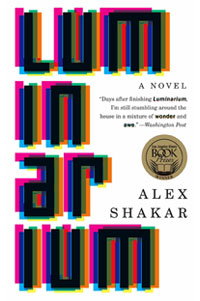|

Luminarium
Alex Shakar
Soho Press
2011
432 pp.
There is no way a person thirty years ago could read Alex Shakar’s Luminarium, and that is not just because the internet, online gaming, technology, and 9/11 all heavily influence the structure of the novel; it isn’t because the big themes—meaning of life, meaning of death, search for self, search for purpose—aren’t part of a timeless and universal discussion. These are, of course, large and powerful themes, ones that Shakar carefully delves into without becoming overbearing or turning into the Preacher In the Pulpit. Instead, the reason nobody thirty years ago could read this book is because they would not have seen The Matrix.
The Matrix, for anyone who doesn’t remember, was released in 1999, at the height of the Y2K-computers-will-destroy-society-and-rule-the-Earth hysteria, and did nothing to quell such notions. It also exploded the collective minds of computer geeks, anyone with a Jesus complex, philosophy majors, and Hollywood studio execs who decided every movie thereafter must use Matrix-esque CGI and stunt maneuvers. At its heart, however, The Matrix simply asked a very complex question: what is real and will we be happier knowing said reality—the blue pill / red pill Dr. Seussian dilemma?
The ability to read Luminarium, therefore, depends not on one’s ability to grasp such philosophical notions but to have confronted them in day-to-day life. Without The Matrix, we would still be at this point in modern society, I’m sure, but the movie brought up the questions that technological advancement continues to force us to ask and evaluate; the movie acts as a cultural anchor whereby we can trace the trajectory of our computerized lives, ones in which a hard question to answer is, who is more real, me or my Facebook profile?
For Fred Brounian, our book’s protagonist, reality’s existence starts to dissolve as he deals with George’s, his twin brother, coma and impending death. Faith, by way of Hinduism, Buddhism, Catholic purgatory, and self-reliance, blend together as each represents a type of hope needed for Fred to explain his daily life. Shakar uses the mystery of supposed otherworldly communications, science-induced faith, and (the always big one) love, whether from / for family or a significant other, to give himself room to explore the crisis at the heart of all humanity: what the fuck are we doing here?
There are, of course, no actual answers because what would be the purpose of giving them when really what Shakar wants to give us readers is a faith of our own. George, alive or dead, has faith in the ability to change the world, even if it is through a meta-as-hell online Earth-simulation; Fred has faith that his brother George deserves the chance to live; the rest of the world has faith that it has a right to exist. The intertwining realities mean no single reality has more meaning, no way to objectively state this is how things are.
There is something delicate about Shakar’s prose, a deftly handled precision of such monumental ideas because it would be easy, I imagine, to get lost in preaching, to tell readers how they must find purpose and find meaning; instead, Shakar asks questions without asking, forcing us to consider ourselves:
he had to stop and wonder if he’d really woken up at all, if he weren’t just in some bed, dreaming some coma dream. Or if, in fact, he’d never returned from that nowhere / nowhen / nohow at all. Or if, in truth, he’d ever issued from it to start.
It’s a beautiful moment, full of wonder and denial, the sort of complex, fully human philosophy inherent in being alive: am I really here, am I real? The questions haunt, in a delicious, bone marrow sort of way, where the heaviness and lingering of the flavor nearly matches the actual experience of tasting it. We may look for the un-complicated life, but without such complexity, there’d be no reason for expression.
--Joel Lee
Joel Lee is a graduate of the NEOMFA program. He has had some poetry and nonfiction published, including the AWP Intro Journals award piece, "Self: A Musical," in the College of Wooster's Artful Dodge. Other writing appears on a self-serving blog, I Remember Cassettes, should you find yourself bored on the internet. Along with his wife, their gaggle of pets, and a whole host of random wildlife, he lives in a log cabin in Amish country, where he works on developing acceptable facial hair. |
|

